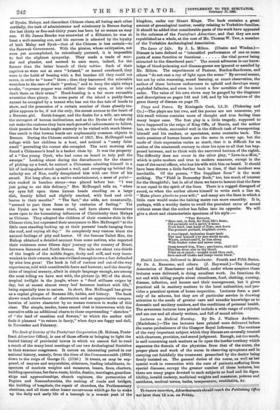Plays and Poems. By Keningale Cook, LL.D. (Pickering and Co.)—The
plays are but two, and the poems are not numerous, yet this small volume contains more of thought and true feeling thau. many larger ones. The first play is a little tragedy, supposed te have happened in the reign of King Offa, of Mercia, and the author has, on the whole, succeeded well in the difficult task of transporting himself and his readers, or spectators, some centuries back. The main passions of human hearts are the same in every age, but the mode of their expression varies so much, that it is difficult for an author of the nineteenth century to close his eyes to all that has hap- pened between, and to think with the narrowed horizon of the eighth._ The difficulty does not occur in the other play, " Love-in-a-Mist," which is quite modern and true to modern manners, except in the case of the naval officer, who has his wife with him on board. It should have been thrown a little farther back in time, if that incident was inevitable. Of the poems, "The Suppliant Zeus" is the most striking. The "Field in Domesday Book," too, has much of interest for the thoughtful; but in all of them we have to lament that the form is not equal to the spirit of the lines. There is a rugged disregard of sound, as when the author allows himself to write such a line as, "Make plasm plastic to your will ;" and many are the lines in which a little care would make the halting metre ran more smoothly. It is,. perhaps, with a worthy desire to avoid the prevalent error of sound without sense that the author has fallen into its opposite. We will. give a short and characteristic specimen of his style :—
THE EPITAPH.
"Here rest, in dust, far from life's flame, Old garments and a perisL'd name.
ess hard, lean hand of Time, oast down The greenest garland, brightest crown.
A rose-tipped, beckoning finger leads The man himself o'er new-world meads, Where, ardent-wed, he hies along With fresher robes and newer song.
Creep toward him, Time; perchance, shall fall This fine dress also to thy thrall. Press on at speed,—nonght must thou sack, Save cast-off cloaks and lamps burnt black."














































 Previous page
Previous page